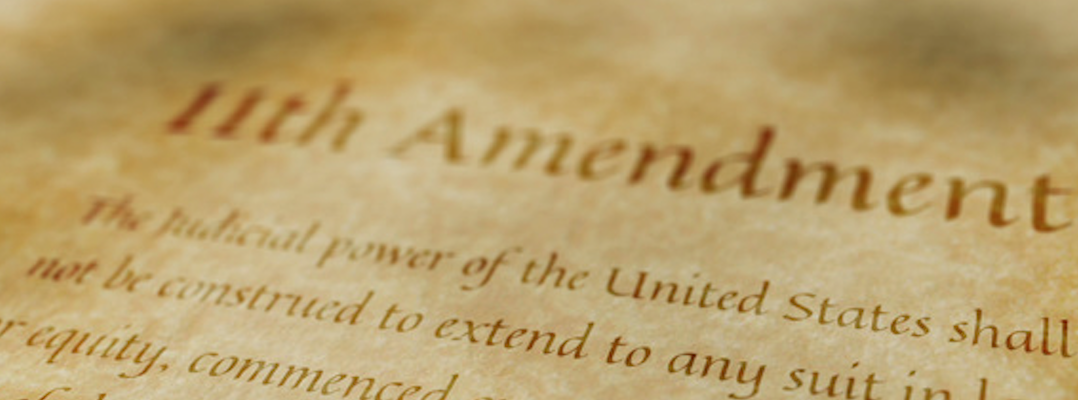By: Omar J. Andino Figueroa*
Puerto Rico is neither a state nor an independent country and it remains under the territorial clause of the United States Constitution. However, using an incorrect analysis, since 1981 Federal Courts have repeatedly given Puerto Rico Eleventh Amendment immunity in federal courts, as though it were a state.[i] Justice Breyer, who was a First Circuit judge back then, decided that Puerto Rico was entitled to the Eleventh Amendment’s protection. Puerto Rico is not a state; it is a United States territory. Meanwhile, unlike Puerto Rico, other territories have not been rewarded with Eleventh Amendment immunity. Puerto Rico’s Eleventh Amendment immunity status may be in jeopardy due to the new constitutional regime after a Puerto Rico Supreme Court decision that was affirmed by the United States Supreme Court.[ii]
The United States Supreme Court has never decided that Puerto Rico holds Eleventh Amendment immunity.[iii] However, almost two years ago, the Puerto Rico Supreme Court decided Pueblo v. Sanchez Valle.[iv] This case is one of the most important cases in our constitutional history. Sanchez Valle altered, not only the interaction between state and federal authorities in terms of criminal procedure, but also a countless number of key variables in Puerto Rico’s constitutional relationship with the United States. One of them, certainly, is the Eleventh Amendment immunity as it was known to Puerto Rico in federal courts. The United States Congress also spoke recently regarding Puerto Rico’s supposed sovereignty. Shortly after the Court’s opinion in Sanchez Valle was published, Congress approved the Puerto Rico Oversight, Management, and Economic Stability Act (known as “PROMESA”) to manage the debt crisis in Puerto Rico and took away important powers from the Commonwealth’s government.[v]
This short commentary argues that, following Sanchez Valle, Puerto Rico should not be entitled to Eleventh Amendment immunity in federal courts. After fifty-five years of commonwealth status, Puerto Rico remains a territory of the United States and is not a sovereign separate from the federal government. Instead, Puerto Rico’s Constitution is just a creature of the federal government. Because Puerto Rico remains a territory, it should be treated as such for Eleventh Amendment analysis.
I. Brief Explanation of the Eleventh Amendment and Sovereign Immunity
The Eleventh Amendment of the United States Constitution declares: “The judicial power of the United States shall not be construed to extend to any suit in law or equity, commenced or prosecuted against one of the United States by citizens of another state, or by citizens or subjects of any foreign state.”[vi] By its plain text, the Eleventh Amendment refers only to the sovereign immunity of states and mentions nothing about the territories. The main purpose of this amendment is to prevent a state from being sued without the state’s consent.[vii] The protection of the states was fundamental for the nation’s founding fathers. Therefore, the Supreme Court’s failure to recognize a state’s immunity promptly triggered a constitutional amendment.[viii] The Eleventh Amendment bars not only claims by citizens of another state but also suits by a state’s own citizens.[ix] The Supreme Court’s interpretation of the Eleventh Amendment prohibits almost any type of suit against states without their consent. For example, the Supreme Court has held that the sovereign immunity of the Eleventh Amendment extends to administrative procedures.[x] In addition, Congress can abrogate a state’s sovereignty in only one circumstance. The Supreme Court has found the only valid exercise of sovereign immunity abrogation in section five of the Fourteenth Amendment.[xi] Nevertheless, this approach is only used to examine whether Congress acted pursuant to a valid exercise in abrogating the sovereign immunity of a state. Congress has plenary power over territories and doesn’t have to meet the test established in Seminole Tribe of Florida v. Florida.[xii] In theory, Congress can create or eliminate governmental institutions in the territories.
There is a difference between common law immunity and Eleventh Amendment immunity. In the first place, common law immunity is a pre-constitutional doctrine that has protected the states since their creation.[xiii] Referring to common law immunity the Supreme Court has stated that “[a]s the Constitution’s structure, its history, and the authoritative interpretations by this Court make clear, the States’ immunity from suit is a fundamental aspect of the sovereignty which the States enjoyed before the ratification of the Constitution, and which they retain today. . . .”[xiv] Common law immunity protects a state from suit only in its own courts.[xv] While Eleventh Amendment immunity can only be abrogated by Congress under section five of the Fourteenth Amendment, common law immunity can be abrogated either by Congress or the state.[xvi] Common law immunity does not protect a state from being sued in another sovereign’s courts.[xvii] Therefore, common law immunity does not protect a state from being sued in a federal court.
Meanwhile, Eleventh Amendment immunity is a constitutional principle and it protects the state from suit in the courts of the other sovereign in the United States: the federal government. This means that, without the Eleventh Amendment, a sovereign “has immunity from claims raised in its own courts under its own local laws but not from claims raised in federal court based on federal law.”[xviii] Territories usually enjoy only common law immunity. Federal courts have recognized that Puerto Rico enjoys both common law and Eleventh Amendment immunity.[xix] However, all other territories have repeatedly been denied the Eleventh Amendment protection.
II. The Case of Puerto Rico
A. Puerto Rico’s Eleventh Amendment Treatment
Since 1981 the United States Court of Appeals for the First Circuit has consistently held that Puerto Rico cannot be sued in federal courts without its consent.[xx] Therefore, federal courts treat Puerto Rico as a state for sovereign immunity analysis. Firstly, the First Circuit’s analysis is based on a mistaken approach to Puerto Rico’s constitutional history. Secondly, even if some can defend the First Circuit’s approach, it doesn’t hold up after the Supreme Court’s decision in Puerto Rico v. Sanchez Valle.
The opinion in Ezratty v. Puerto Rico discusses the Eleventh Amendment issue exclusively in a footnote.[xxi] In footnote seven of the opinion, Justice Breyer relies on two District Court opinions without any discussion of Puerto Rico’s history and political status.[xxii] One of the District Court’s opinions indicates that “Puerto Rico possesses the attributes of sovereignty possessed by the states, immunity from suit without consent being one of them.”[xxiii] The whole rationale behind this method to Puerto Rico’s Eleventh Amendment immunity status is predicated on a mistaken belief: that after 1952 Puerto Rico was given sovereignty similar to that of a state.
Other circuits have decided that Puerto Rico remained a territory after 1952’s Public Law 600, which culminated in the creation of the Commonwealth of Puerto Rico and the approval of the Puerto Rico Constitution.[xxiv] For example, regarding the approval of Public Law 600, the Third Circuit said that “[t]he legislative history of the Act of July 3, 1950, Public Law 600 offers strong support for the plaintiff’s position that Puerto Rico, insofar as the issues at bar are concerned, may be deemed to have a status analogous to that of a territory.”[xxv]
Today, it is very difficult to argue in favor of Justice Breyer’s approach in Ezratty. Recently, the Supreme Court of the United States and the United States Congress have made clear that Puerto Rico doesn’t enjoy the sovereignty that was supposedly achieved in 1952.[xxvi] On the contrary, Puerto Rico’s Constitution is a creation of the United States Congress.
B. Puerto Rico’s Sovereign Immunity After Pueblo v. Sanchez Valle
In Pueblo v. Sanchez Valle, Justice Martinez Torres, writing for the majority of the Supreme Court of Puerto Rico held that because the ultimate source of Puerto Rico’s sovereignty derived from the federal government the Double Jeopardy Clause of the United States Constitution bars Puerto Rico and the United States from successively prosecuting a single person for the same behavior under equivalent criminal laws.[xxvii] Without much difficulty, the United States Supreme Court affirmed the decision.[xxviii] The Supreme Court determined that:
Because the ultimate source of Puerto Rico’s prosecutorial power is the Federal Government—because when we trace that authority all the way back, we arrive at the doorstep of the U.S. Capitol—the Commonwealth and the United States are not separate sovereigns. That means the two governments cannot “twice put” respondents Sánchez Valle and Gómez Vázquez “in jeopardy” for the “same offence.”[xxix]
The Supreme Court confirmed what everybody knew: Puerto Rico remains a territory and has no independent sovereignty from the federal government. Although it may sound harsh, the federal government has complete control over Puerto Rico. The United States Congress “in Public Law 600, authorized Puerto Rico’s constitution-making process in the first instance; the people of a territory could not legally have initiated that process on their own.”[xxx] In the same way, the Supreme Court noted that “Congress, in later legislation, both amended the draft charter and gave it the indispensable stamp of approval; popular ratification, however meaningful, could not have turned the convention’s handiwork into law.”[xxxi]
It is true that Sanchez Valle only deals with the ultimate sovereignty test under the Double Jeopardy Clause. It is also true that Puerto Rico has autonomy over local affairs, comparable to a state’s. However, that cannot cloud the important expressions of the Supreme Court in Sanchez Valle and the future implications they will have in other areas of constitutional concern for Puerto Rico, particularly the Eleventh Amendment.
The Supreme Court has never ruled that Puerto Rico deserves Eleventh Amendment protection. In fact, the Supreme Court expressly denied addressing the issue in Puerto Rico Aqueduct and Sewer Authority v. Mercalf & Eddy, Inc.[xxxii] The parties in that case didn’t challenge Puerto Rico’s Eleventh Amendment treatment. Thus, the Court indicated:
As the case comes to us, the law of the First Circuit—that the Commonwealth of Puerto Rico is treated as a State for purposes of the Eleventh Amendment, see Ramirez v. Puerto Rico Fire Serv., 715 F.2d 694, 697 (1983)—is not challenged here, and we express no view on this matter.[xxxiii]
To this day, the Eleventh Amendment’s applicability to Puerto Rico remains unsettled. As a product of Sanchez Valle, if the Supreme Court was to hear the controversy, it would probably decide that Puerto Rico is not a state for the purposes of the Eleventh Amendment. The Supreme Court could easily come to such a decision by stating that “the Eleventh Amendment was passed as a jurisdictional bar to suits brought against state governments in federal courts.”[xxxiv] In the same way, the Supreme Court, as it has been said for the case of the U.S. Virgin Islands, would likely articulate that “[t]he inherent prejudice against a state, thought to arise from it being sued in federal court, cannot exist here because the Virgin Islands [like Puerto Rico]as a legal entity is a creature of the federal government.”[xxxv]
There is no justification to grant Puerto Rico an Eleventh Amendment immunity status that is inapplicable to territories. As matter of federal law, Puerto Rico should only be permitted common law immunity as every other territory.
Conclusion
It is clear that the Eleventh Amendment was written for the safety of the states and not for the territories. Therefore, consistent with this principle, the District of Columbia, Guam, the Commonwealth of the Northern Mariana Islands and the U.S. Virgin Islands have all been left without the protection of the Eleventh Amendment. All those territories analogous to Puerto Rico’s situation –except for the District of Columbia– entered into some type of covenant with the federal government. However, federal courts time after time have held that those covenants didn’t change the territorial status of those islands.
There is truly no good reason to keep the First Circuit’s approach to Puerto Rico’s sovereign immunity status. As it has been argued, Puerto Rico does not enjoy any type of sovereignty, as it was believed in 1952, other than managing some local affairs. More importantly, the recent enactment of PROMESA has extinguished many aspects of local affairs administration that were left to the Commonwealth’s government.[xxxvi] PROMESA clearly says that “the provisions of this Act shall prevail, over any general or specific provisions of territory law, State Law, or regulation that is inconsistent with this act.”[xxxvii] In the same way, the Supreme Court’s decision in Sanchez Valle confirms this view and a logical path seems to say that in the future both PROMESA and Sanchez Valle will be used to reverse all First Circuit case law regarding Eleventh Amendment protection for Puerto Rico.
After concisely discussing the so called “Puerto Rico’s Eleventh Amendment Status Anxiety”,[xxxviii] one thing is for sure: whatever happens in the future, it will greatly affect Puerto Rico’s status within the United States constitutional system. If the Supreme Court decides that Puerto Rico falls within the definition of state of the Eleventh Amendment, it will have great political and legal consequences. That conclusion would be contrary to the Court’s expressions in Sanchez Valle. On the other hand, if the Court decides that Puerto Rico is not a state for Eleventh Amendment matters, it would be consistent with its words in Puerto Rico v. Sanchez Valle and would not be a great surprise.
*The author is a third-year student at the University of Puerto Rico School of Law and member of the Editorial Body of the University of Puerto Rico Law Review.
[i] Ezratty v. Puerto Rico, 648 F.2d 770 (1st Cir. 1981).
[ii] See Puerto Rico v. Sanchez Valle, 136 S. Ct. 1863 (2016).
[iii] Adam D. Chandler, Puerto Rico’s Eleventh Amendment Status Anxiety, 120 YALE L. J. 2183, 2188 (2011).
[iv] Pueblo v. Sanchez Valle, 192 DPR 594 (2015).
[v] See Puerto Rico Oversight, Management, and Economic Stability Act (PROMESA), Pub. L. No. 114-187, 130 Stat. 549 (codified at 48 U.S.C. §§ 2101-2241 (2016)).
[vi] U.S. Const. amend. XI (emphasis added).
[vii] Chandler, supra note 3, at 2184.
[viii] Id. at 2184-85.
[ix] Idaho v. Coeur d’ Alene Tribe, 521 U.S. 509 (2004).
[x] Federal Maritime Commission v. South Carolina State Ports Authority, 535 US 743 (2002).
[xi] Seminole Tribe of Florida v. Florida, 517 U.S. 44 (1996). Section five of the fourteenth amendment provides: “Congress shall have the power to enforce, by appropriate legislation, the provisions of this article.” U.S. Const. amend. XIV.
[xii] Id.
[xiii] Chandler, supra note 3, at 2185.
[xiv] Alden v. Maine, 527 U.S. 706, 713 (1999).
[xv] Chandler, supra note 3, at 2185.
[xvi] Id.
[xvii] Id.
[xviii] Id. See Ngiraingas v. Sanchez, 495 U.S. 182, 205 (1990).
[xix] Chandler, supra note 3, at 2188.
[xx] See Ramirez v. Puerto Rico Fire Service, 715 F. 2d 694 (1sr Cir. 1983); Consejo de Salud de la Comunidad de la Playa de Ponce, Inc. v. Gonzalez-Feliciano, 695 F.3d 83, 103 n.15 (1st Cir. 2012); Irizarry-Mora v. University of Puerto Rico, 647 F.3d 9 (1st Cir. 2011).
[xxi] Ezratty v. Puerto Rico, 648 F.2d 770, 776 n.7 (1st Cir. 1981).
[xxii] Chandler, supra note 4, at 2190. See Ramirez v. Puerto Rico Fire Service, 715 F. 2d 694 (1sr Cir. 1983); Carreras Roena v. Cámara de Comerciantes, Inc., 440 F.Supp. 217, 219 (D.P.R. 1976); Ursulich v. Puerto Rico National Guard, 384 F.Supp. 736, 737 (D.P.R. 1974).
[xxiii] Carreras Roena, 440 F.Supp. at 219.
[xxiv] See Detres v. Lions Bldg Corp., 234 F.2d 596 (7th Cir. 1956); Americana of Puerto Rico, Inc. v. Kaplus, 368 F.2d 431 (3rd Cir. 1966).
[xxv] Americana of Puerto Rico, 368 F.2d at 435. See Detres, 234 F.2d at 599 (“The legislative history of the Act providing for this last change in the government of Puerto Rico shows very definitely that those members of Congress most responsible for its enactment thought that the Act would not change Puerto Rico to some political entity other than a territory.”)
[xxvi] See Puerto Rico Oversight, Management, and Economic Stability Act (PROMESA), 48 U.S.C. §§ 2101-2241 (2016); Puerto Rico v. Sanchez Valle, 136 S.Ct. 1863 (2016).
[xxvii] See Pueblo v. Sanchez Valle, 192 DPR 594 (2015).
[xxviii] Surprisingly, two of the most respected constitutionalist in Puerto Rico, mistakenly, agreed that the U.S. Supreme Court was going to reverse the judgment from the Supreme Court of Puerto Rico. See Embajador Microjuris al Día, “Es casi como habernos ganado la Loto”: Discuten posible desenlace del recurso de certiorari sobre doble exposición, Microjuris al Día, (November 10, 2015), https://aldia.microjuris.com/2015/11/10/es-casi-como-habernos-ganado-la-loto-discuten-posible-desenlace-del-recurso-de-certiorari-sobre-doble-exposicion/ (last visited March 28, 2017); Efrén Rivera Ramos, Navegando el status, El Nuevo Día (October 20, 2015), http://www.elnuevodia.com/opinion/columnas/navegandoelstatus-columna-2114451/ (last visited January 18, 2017).
[xxix] Sánchez Valle, 136 S.Ct. at 1876-77.
[xxx] Id. at 1875.
[xxxi] Id.
[xxxii] Puerto Rico Aqueduct and Sewer Authority v. Mercalf & Eddy, Inc., 506 U.S. 139 n.1 (1993).
[xxxiii] Id.
[xxxiv] Tonder v. M/V The Burkholder, 630 F. Supp. 691, 693-94 (D.V.I. 1986).
[xxxv] Id.
[xxxvi] See Puerto Rico Oversight, Management, and Economic Stability Act (PROMESA), 48 U.S.C. §§ 2101-2241 (2016).
[xxxvii] Id. at § 2103 (emphasis added).
[xxxviii] See Chandler, supra note 3.


